Kolten Wong Swing Analysis
Kolten Wong is one of the Cardinals' premier, and most
important, prospects. While they have an insurance policy in
place in the form of Mark Ellis, the Cardinals believed enough
in Wong's potential that they felt comfortable trading David
Freese.
I was driven to put this piece together by hearing Kolten
Wong's recent comments that part of his problem at the end of
last year was that his swing got long. As you may know, I think
most diagnoses of hitting problems are bogus and based on a number of
hitting myths rather than
an understanding of what a good swing actually looks like.
As a result, I decided to take a detailed look at Kolten
Wong's swing and see what is actually going on with it.
Arm Bar
When evaluating a hitter, the first thing I look at is what
their upper body tends to look like at the Point Of Contact
(POC).
I say "tend to" because every hitter has to make adjustments
and will look somewhat different on every swing. However, I have
found that the best hitters will look generally the same at
the POC, in large part because they know how to adjust to pitches and
consistently put good swings on pitches.
When I look at my clips of Kolten Wong, while he tends to get
to a good position at the POC, the way he gets to the POC says
"Daniel Descalso" to me.
In particular, the swing flaw that Kolten Wong shares with
Daniel Descalso is a case of arm bar, where the front arm
extends pretty much fully during the stride. That is a problem
because it can reduce a hitter's adjustability.
Yes, Ken Griffey Jr. had a major arm bar, but he is one of
the few good major leaguers hitters with that flaw, which
suggests that it is a problem that most people can't overcome.
Bad Feet
After the upper body, the next most important item on my
hitter evaluation checklist is the hitter's lower body in
general and their feet in particular.
The feet are important because they can give you a sense of the
hitter's efficiency and their projectability with respect to
both power and average. That is because, as I have found through
my work with
Andres Torres, power and average are inter-related. Within
reason, bad feet are often a sign that a hitter is leaving power
on the table and, with proper instruction, could be expected to
improve their power.
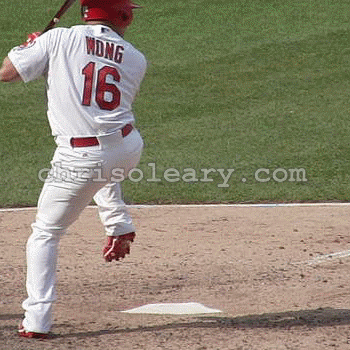
Kolten Wong
2013
When I look at Kolten Wong's feet, I see lots of movement in
his back foot, much more than you see in Albert Pujols' Back
foot.
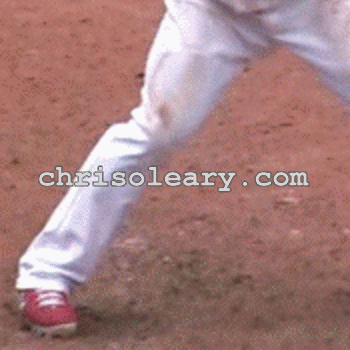
Albert Pujols's Back Leg
In particular, Kolten Wong tends to roll onto the inside
of his back foot during his stride, which is a movement pattern that can
bleed power and that you can see in clips of Pete Kozma.[1]
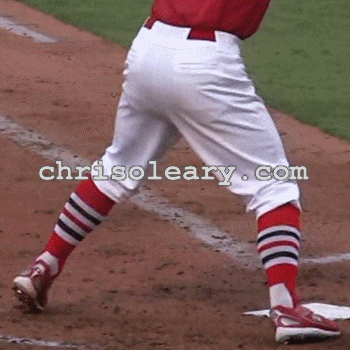
Pete Kozma's Feet
2010
I also once worked with a professional hitter who had a
similar problem with rolling onto the inside of his back foot.
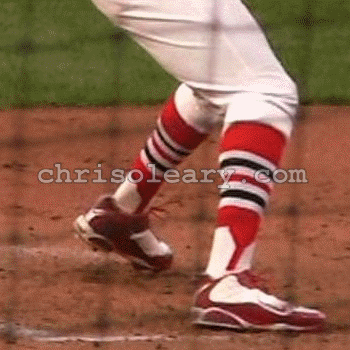
Bad Feet in a AA Client
2010
Maybe it's a coincidence and maybe it's not, but that hitter
picked up roughly 80 points of BA and 200 points of OPS at AA
after I had a conversation with him about what his back foot was
actually doing and what it should be doing.
Finally, although I don't have enough clips to say anything
definitive, I believe that I also see in Kolten Wong a tendency
to shift his weight back onto his heels during his leg lift.
Andres Torres has also showed a similar tendency, and it's
something I have spent a significant amount of time talking to
him about.
Lunging
Part of Kolten Wong's problem with his feet is due to his tendency to
lunge forward at the ball and not stay back.
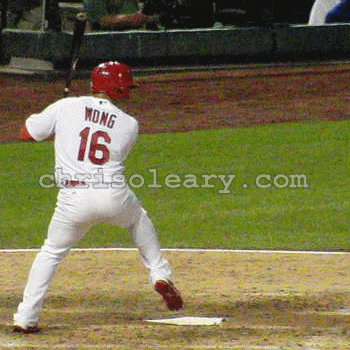
Kolten Wong
2013
You can see this tendency to lunge forward in the clip above.
Notice how, at the POC, Kolten Wong's torso is leaning forward
toward the pitcher. In the best hitters, their torsos are
generally at most vertical at the POC and, quite often, are
leaning back toward the catcher some.
Of course, the clip above is another good example of bad
feet, and this larger problem with bad feet is likely tied into
both Kolten Wong's lunging and the length of his stride.
Leg Lift
Jose Bautista is a hitter who spent the first nine years of
his career as a replacement level player and then, as if by a
miracle, transformed into a 7+ win player. While he has cooled
off in the past two years, in large part due to injury problems,
he remains a 3+ win player, which is nothing to spit at.
Many people have speculated about what Jose Bautista's secret
is. What did he do or change that helped him transform his
swing?
While some people have speculated that the answer to the
question is PEDs, and others believe that the answer is how he
loads, I believe that the correct answer comes down to something
else.
His leg lift.
When he was struggling, Jose Bautista used a number of
different strides. However, the common thread to all of his
strides was that he started them relatively late, often around
the time or even after the ball was released. Now, and as I
explain in detail in my piece on
Timing, if you look at the timing of Jose Bautista's stride,
you will see a significant difference.
I first noticed this pattern as part of my work with
Andres Torres. He too sometimes utlizes a relatively high
leg lift and, during the past two years, has had occasional
problems catching up to good fastballs.
So how is this relevant to Kolten Wong?
When I look at Kolten Wong, I see the same timing problem
that Bautista had before he put it all together and that Torres
tends to develop when he is struggling (and that tends to cause
Andres to start tweaking his stride).
Head Movement
One telltale of a Lau/Hriniak swing is that the hitter is
looking straight down at the Point Of Contact. One hitter who
does this is Ryan Ludwick.
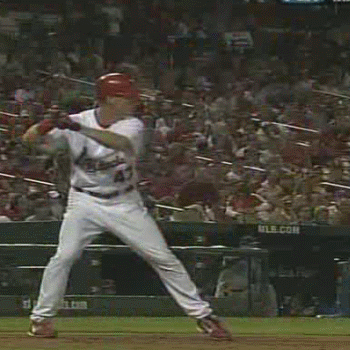
Ryan Ludwick
The problem with that much head movement is that it can cause
the hitter to lose sight of the ball earlier than is optimal,
which can make them vulnerable to quality, late-breaking
pitches.
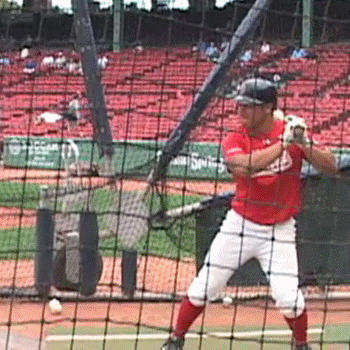
Kolten Wong
Although he doesn't finish looking down at the ground in all
of my clips, I saw enough of a suggestion of it that I went
looking for it in other clips of Kolten Wong and found a good
example of it in the clip above.
Back Arm Dominance
One milestone that some swing analysts look for is what the
hands do to relative to the back elbow. Basically, it's
potentially problematic if the hands get behind, and outside of,
the back elbow, because that can lengthen the swing and, in some
cases, force the hitter to make contact farther out front than
is optimal.

Kolten Wong
2013
In the clip above, Kolten Wong's hands go right to the edge.
While they don't go past the point of no return, they get close
enough that you have to wonder if that is part of what Kolten
Wong is feeling when he talks about his swing getting long.
Of course, this problem can often be related to a hitter
being told to pull the knob to the ball, and a resulting problem
with a dominant back arm, so it would be helpful
to know exactly what Kolten Wong has been taught in terms of
hitting mechanics.
Swing Plane
If you are familiar with my work, you know that one of my
least favorite swings is the swing of Joe Thurston. I believe
that Joe Thurston is a gifted athlete who has been taught to do
pretty much everything that the conventional wisdom about
hitting teaches and whose swing has been absolutely ruined as a
result.
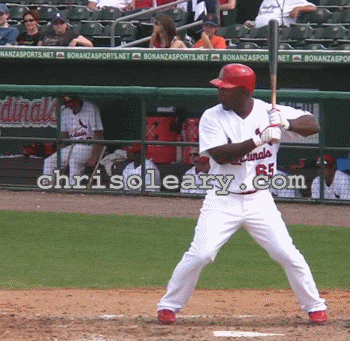
Joe Thurston
Although it's a devastating comparison, when I look at Kolten
Wong's swing plane, and other aspects of his swing, what I see
is some of what you see in the swing of Joe Thurston.
In particular, what I see some suggestions of are a bat path
that, instead of hitting the ball with a slight uppercut,
instead continues to travel downward through the POC.
The Good News
So that I close on an up note and not a down note, let me say
that, if you can get past all of the Lau/Hriniak garbage, there
are (important) things to like in Kolten Wong's swing and that
tell me that he isn't a lost cause.

Kolten Wong
Five Frame Swing
The first positive about Kolten Wong' swing is that, while
it's sub-optimal, it's still short and quick enough to get the
job down. Although I can't see his feet, it looks like Kolten
Wong's swing comes in at five frames, which is where it needs to
be.
Of course, that tells me that the problems that Kolten Wong
is having aren't due to his swing being long, but to the issues
I have pointed out above. The concern is that, in an effort to
fix his problem, he could very well make things worse and not
better.
Coil
Kolten Wong's lower body moves very well. While his swing
looks like it was molded by a disciple of Charley Lau and Walt
Hriniak, his lower body still moves like Ted Williams' lower
body did, which is obviously very important and very good.
However, the question is whether all of the Lau/Hriniak garbage
will prevent Kolten Wong from reaching his full potential.
Notes
[1] I have seen this problem with rolling onto the inside of the back foot in
Cardinal hitters that I wonder if it's occuring due to
something that is being taught. For instance, encouraging
hitters to widen their stance, and getting them into a stance
that is too wide, could cause what I am seeing.
|